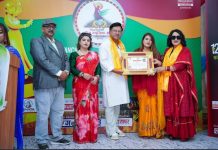Kathmandu, Nepal- In the realm of Nepali music, Prakash Waiba is known as a gifted soul blessed with a melodious voice. Born in Ghura Faat, Kamalamai Municipality, Sindhuli, he continues his journey to carve a distinct identity in the musical landscape of Nepal.
For him, music is not simply a profession, but a calling — a way to preserve and share art, culture, and language with the world. With over a decade of devotion and discipline, Waiba has endured the ebb and flow of the musical path, refusing to give up, and pledging to move forward with even greater patience and perseverance.
After living in Qatar and Dubai since 2016, he realised that true fulfilment lay not abroad but in his homeland. Returning to Nepal, he chose to dedicate himself fully to music, serving his community and culture. His artistry has not only been confined to singing; he has acted in the Tamang film “Chhodi Najanu”, appeared in over 17 music videos, and lent his voice to more than two dozen songs. Among his notable works are “Himali Kanchi”, “Kya Ramri Maichyang”, “Brandwali”, “Chauka Panja Dau”, “Gopya Setting Ma”, “Brelsang Lai Mhanzhi”, “Ghar Mero Sindhuli Dhura Gaun”, “Yo Hamro Lhosar Melama”, and “Parlani Jarima.”
Through these songs, Waiba seeks not only to entertain but also to safeguard art, culture, and language, while sharing them on international stages.
Exclusive Conversation made with Singer/ Composer Prakash Waiba:
What does music mean to you?
“For me, music is life itself. One might abandon alcohol or cigarettes, but music is an intoxication that never leaves. It is akin to meditation — a state that calms the soul. Music is a companion in both joy and sorrow, a faithful reflection of existence.”
What challenges have you faced in music?
“Every path carries its own obstacles. Embracing music as my path, I have encountered many difficulties. It is not as effortless as it may appear; one must cultivate the capacity to endure hardship. Music is like a profound addiction — once it takes root, it cannot be abandoned. The challenge is not to escape it, but to grow within it.”
Recently, many Nepali songs contain loose morals and double meanings. What is your view?
“Music should safeguard culture and art, yet today some songs carry words that pollute the social fabric. Such music harms society deeply. Just as films require censorship, so too should music be filtered. Otherwise, what lessons will the younger generation absorb? Institutions in this field must bring such songs within a moral and legal boundary. For without values, music loses its essence.”
Is it necessary to formally learn music?
“Whatever profession one pursues, knowledge is its foundation. The musical field is highly competitive; without knowledge, one cannot excel. To truly rise, one must study the art, understand its depth, and respect its discipline. Only then can music transcend mere sound and become truth.”
Tell us about your recent release, ‘Gopya Setting’.
“The song ‘Gopya Setting’ has lyrics by Prithvi Lama, music by Prayas Tamang, and vocals by myself alongside Anjila Regmi. Its music video has just been released on YouTube. The editing was done by Anil Bishwakarma Puythani, with choreography and direction by Sanjiv Thokar, and cinematography by Durga Shrestha.
The video features several artists, with lead roles played by Sanjiv Gole and Sirjana Ghising. Other appearances include Ramesh Lama, Kriti Gole, Ram Lama, Santosh Sen Thakuri, Juna Sangten, and Prem Dong. The video can be watched on my official YouTube channel, Prakash Waiba Official.”












































